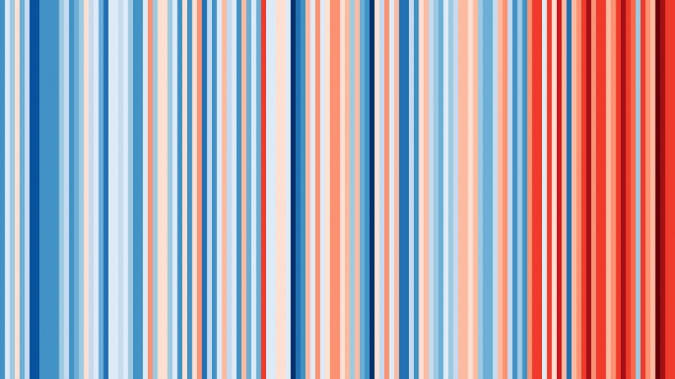Invitation: Climate change - from knowledge to action

The graph visualizes the average temperature for Germany between 1881 and 2017; each strip stands for one year, based on the data set of the DWD. © Ed Hawkins/klimafakten.de
Climate change and its causes are undisputed. But how do we get from knowledge to action? What can science contribute to this? On Thursday, 5.12.2019 at 17:00 Clara Mayer (Fridays for Future), Volker Quaschning (HTW Berlin and Scientists for Future), Bernd Rech (scientific director of the HZB) and Kira Vinke (Potsdam Institute for Climate Impact Research) will discuss these questions. The event takes place in the Bunsen lecture hall of WISTA in Adlershof and is open to the public. Admission is free.
Countless scientific studies show how important it is to limit global warming. We must reduce greenhouse gas emissions at all levels of society and in all sectors in order to achieve our climate targets. But there are many hurdles to implementation. What can science do to speed up action here? Should science interfere at all?
These questions are discussed in an open debate. Participants are Clara Mayer from Fridays for Future, Prof. Volker Quaschning (HTW Berlin and Scientists for Future), Prof. Bernd Rech (Scientific Director of the HZB) and Dr. Kira Vinke of the Potsdam Institute for Climate Impact Research. The debate will be moderated by Rutger Schlatmann (Head of PVcomB at HZB).
The debate is open to the public and will take place in the Bunsen lecture hall of WISTA. Admission is free.
As the discussion takes place within the international user meeting at the HZB, the discussion language is English.
Venue: Bunsen Lecture Hall WISTA, Rudower Chaussee 17, 12489 Berlin
Time: Thursday, 5.12.2019 from 17:00 until 18:30
arö
https://www.helmholtz-berlin.de/pubbin/news_seite?nid=20908;sprache=en
- Copy link
-
Strategisches Positionspapier zur Stärkung der Solarindustrie
Frankfurt, 06. März 2025 – Die führenden deutschen Solarforschungseinrichtungen, die Fachabteilung „Photovoltaik Produktionsmittel“ des Industrieverbands VDMA und das Produktionsplanungs-Unternehmen RCT Solutions, haben ein gemeinsames Positionspapier zur Stärkung der deutschen und europäischen Solarindustrie veröffentlicht. Dieses wird nun an die Parteien übermittelt, die nach der Bundestagswahl im Bundestag vertreten sind. Ziel ist es, die vorgeschlagenen Maßnahmen in die Koalitionsverhandlungen einzubringen und damit die Grundlage für eine widerstandsfähige und wettbewerbsfähige Solarindustrie in Deutschland zu schaffen.
-
Innovative battery electrode made from tin foam
Metal-based electrodes in lithium-ion batteries promise significantly higher capacities than conventional graphite electrodes. Unfortunately, they degrade due to mechanical stress during charging and discharging cycles. A team at HZB has now shown that a highly porous tin foam is much better at absorbing mechanical stress during charging cycles. This makes tin foam an interesting material for lithium batteries.
-
Perovskite solar cells: thermal stress is the key to their long term stability
Perovskite solar cells are highly efficient and low cost in production. However, they still lack stability over the decades under real weather conditions. An international research collaboration led by Prof. Antonio Abate has now published a perspective on this topic in the journal Nature Reviews Materials. They explored the effects of multiple thermal cycles on microstructures and interactions between different layers of perovskite solar cells. They conclude that thermal stress is the decisive factor in the degradation of metal-halide perovskites. Based on this, they derive the most promising strategies to increase the long-term stability of perovskite solar cells.
